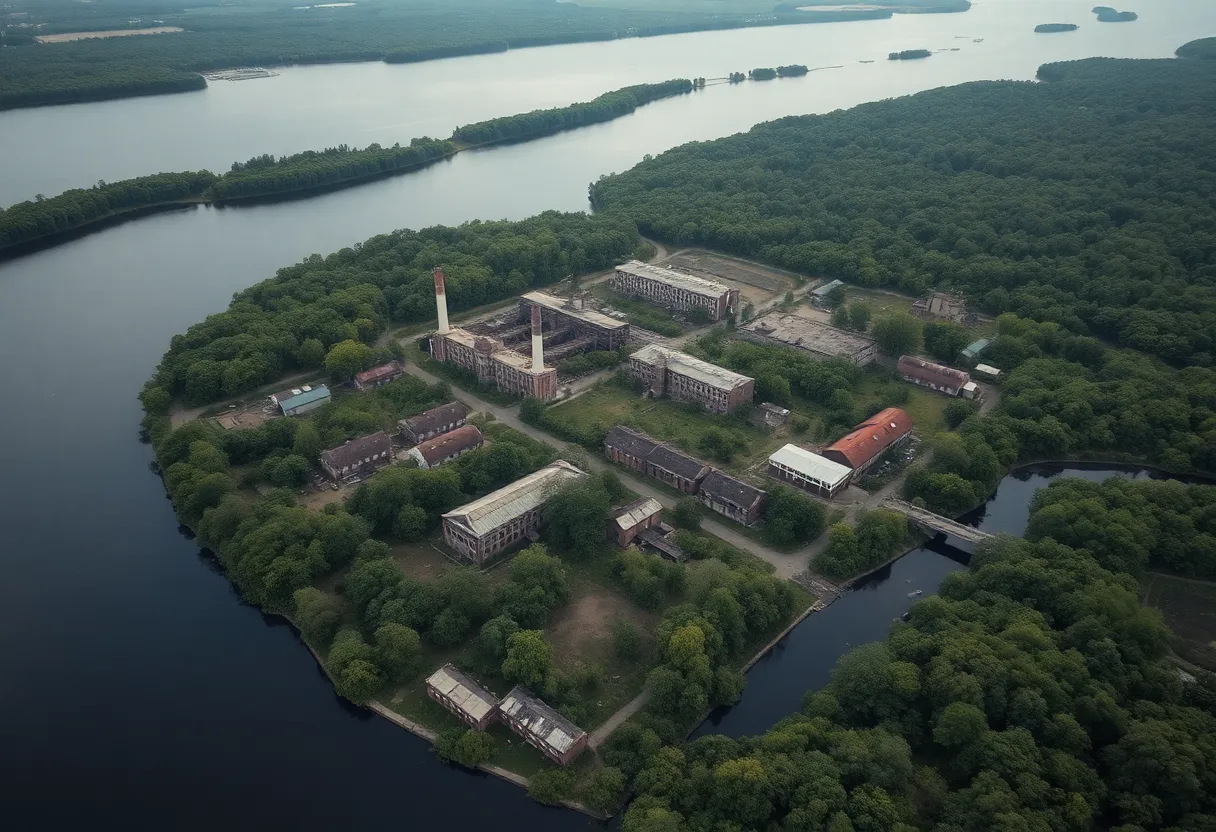News Summary
The Turner Brothers factory in Rochdale, once the world’s largest asbestos producer, faces scrutiny over its redevelopment plans. After decades of abandonment and health concerns from asbestos exposure, community advocates express fears over potential health risks. As Spodden Park Ltd works on decontamination efforts, the local council has denied planning permission for new homes, urging a safer approach to the site’s future. This iconic site represents both industrial history and ongoing health debates.
The Turner Brothers Factory: A Legacy of Asbestos and Controversy
The Turner Brothers factory in Rochdale stands today as a haunting relic of an industrial era long past. Covering an expansive 75 acres beside the serene River Spodden, this once-thriving hub of asbestos production was the largest of its kind in the world, employing thousands of residents until it ceased operations in the 1990s. Following decades of abandonment, the site has recently come back into the spotlight due to ongoing discussions about its redevelopment.
A Brief History
The roots of Turner Brothers date back to 1871, when John, Samuel, and Robert Turner set up their enterprise, initially focused on manufacturing packings with cotton cloth. A pivotal moment came in 1879, when the first shipment of raw asbestos arrived in Britain, following a devastating forest fire in Quebec, Canada. The company seized this opportunity and haltingly pivoted towards producing goods made from this now notorious mineral. By the early 1900s, Turner Brothers expanded its repertoire to include proofing cloths, balata belting, and compressed asbestos fibre jointing, as well as making inroads into international markets.
The demands of World War I saw a surge in production, prompting the installation of modern machinery and the construction of a railway siding at Shawclough station. The post-war boom continued, leading to significant growth and the acquisition of asbestos mining properties in Southern Rhodesia. By 1920, consolidation led to the formation of Turner and Newall Ltd, a company that would go on to dominate the asbestos industry.
Asbestos and its Dark Legacy
The transformation of Turner Brothers into a major player in the global asbestos market carried significant risks—both for the workers and the local community. In 1924, the tragic death of former employee Nellie Kershaw marked the UK’s first recorded case of asbestos poisoning, giving rise to media scrutiny that would haunt the company for decades. Soon after, in 1936, the first victim of mesothelioma, another deadly disease linked to asbestos exposure, was documented, and unsettlingly, this individual was also a Turner Brothers employee.
Despite the emerging health concerns, the factory’s operations flourished through the 1940s and 1950s, with workforce numbers peaking at around 3,000 workers and output reaching staggering levels. An estimated 2,250,000 yards of asbestos cloth and 5,500,000 miles of asbestos yarn were produced annually by 1970. The tide began to turn in the 1980s as growing awareness of asbestos-related illnesses led to a sharp decline in the industry.
Decline and Abandonment
From 1980 onward, Turner Brothers faced increasing compensation claims related to asbestos illnesses, prompting major changes within the company. By 1989, Turner Brothers started retracting its production activities centered around asbestos. The company was sold to Federal Mogul in 1998, leading to a significant reduction in the site’s operations, culminating in the demolition of production facilities in 2001 and the office block in 2004. A fire in 2014 at one of these abandoned sites raised safety and health alarms in the community.
Future Through Decontamination
The landscape of the Turner Brothers factory site may soon be transformed, as Spodden Park Ltd took over in 2021 with plans for decontamination and redevelopment. However, local residents remain apprehensive, voicing concerns over health risks related to asbestos contamination during proposed redevelopment projects. The Rochdale Council recently denied planning permission for a development project of 600 homes due to safety considerations and fears regarding buried asbestos waste, leading developers to rethink their plans and submit new proposals.
Residents and local campaigners, notably Jason Addy, are advocating for the creation of a safe green space rather than residential development, raising alarms about the danger posed by thousands of tonnes of buried asbestos waste beneath the site. Nevertheless, as discussions progress, the future of the Turner Brothers factory looms large, a poignant reminder of a bygone era marred by the shadow of asbestos.
Deeper Dive: News & Info About This Topic
HERE Resources
The Ongoing Asbestos Crisis: Businesses Must Act Now
Additional Resources
- Manchester Evening News: Life Working Inside the Turner Brothers Factory
- Wikipedia: Asbestos
- Manchester Evening News: Abandoned Asbestos Factory Near Rochdale
- Google Search: Rochdale asbestos factory
- BBC News: Turner Brothers Factory and Asbestos Legacy
- Google Scholar: Turner Brothers factory
- Encyclopedia Britannica: Asbestos
- Google News: Turner Brothers factory



















